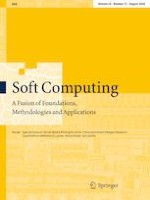12-12-2019 | Methodologies and Application
Feature selection by using privacy-preserving of recommendation systems based on collaborative filtering and mutual trust in social networks
Published in: Soft Computing | Issue 15/2020
Log inActivate our intelligent search to find suitable subject content or patents.
Select sections of text to find matching patents with Artificial Intelligence. powered by
Select sections of text to find additional relevant content using AI-assisted search. powered by
